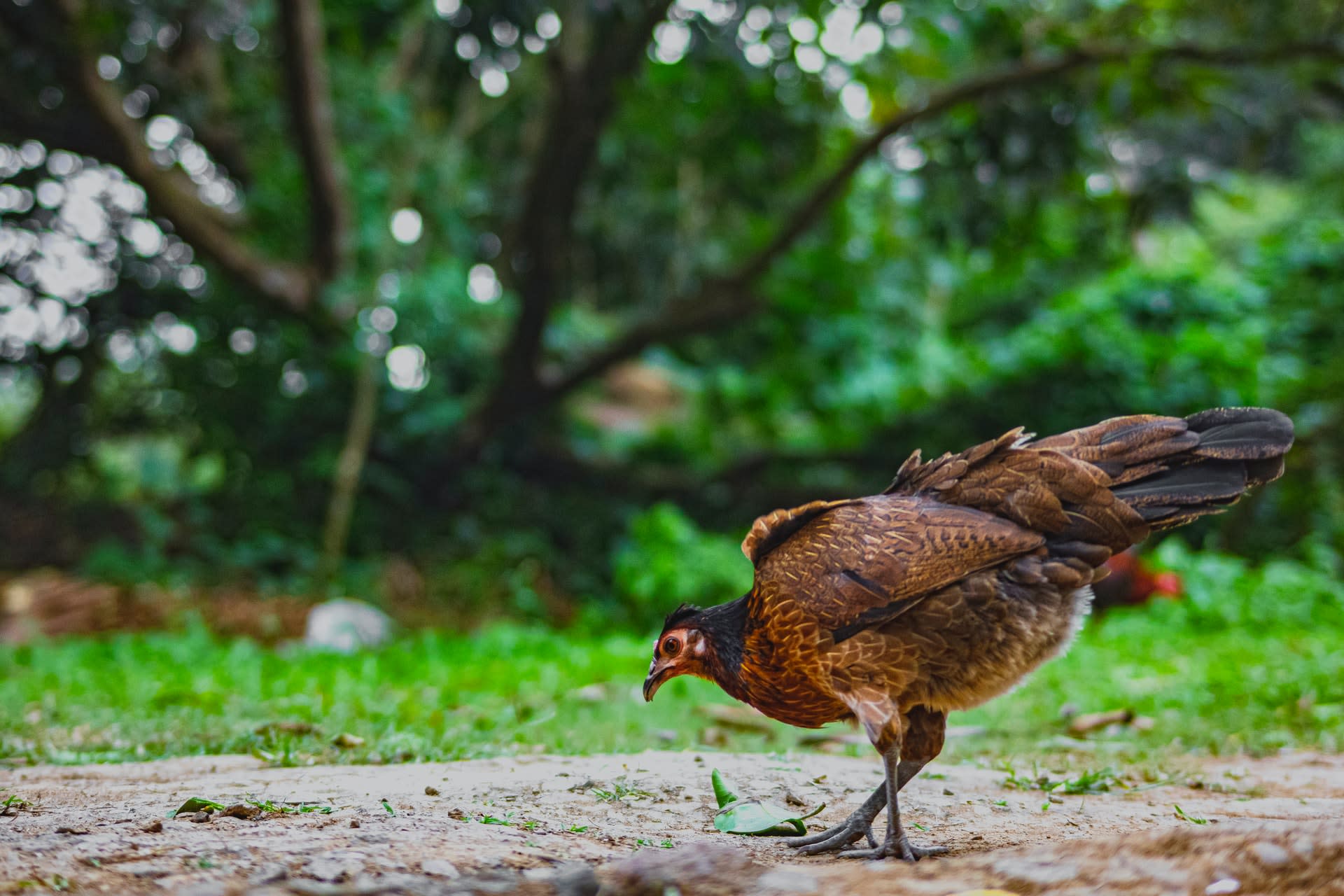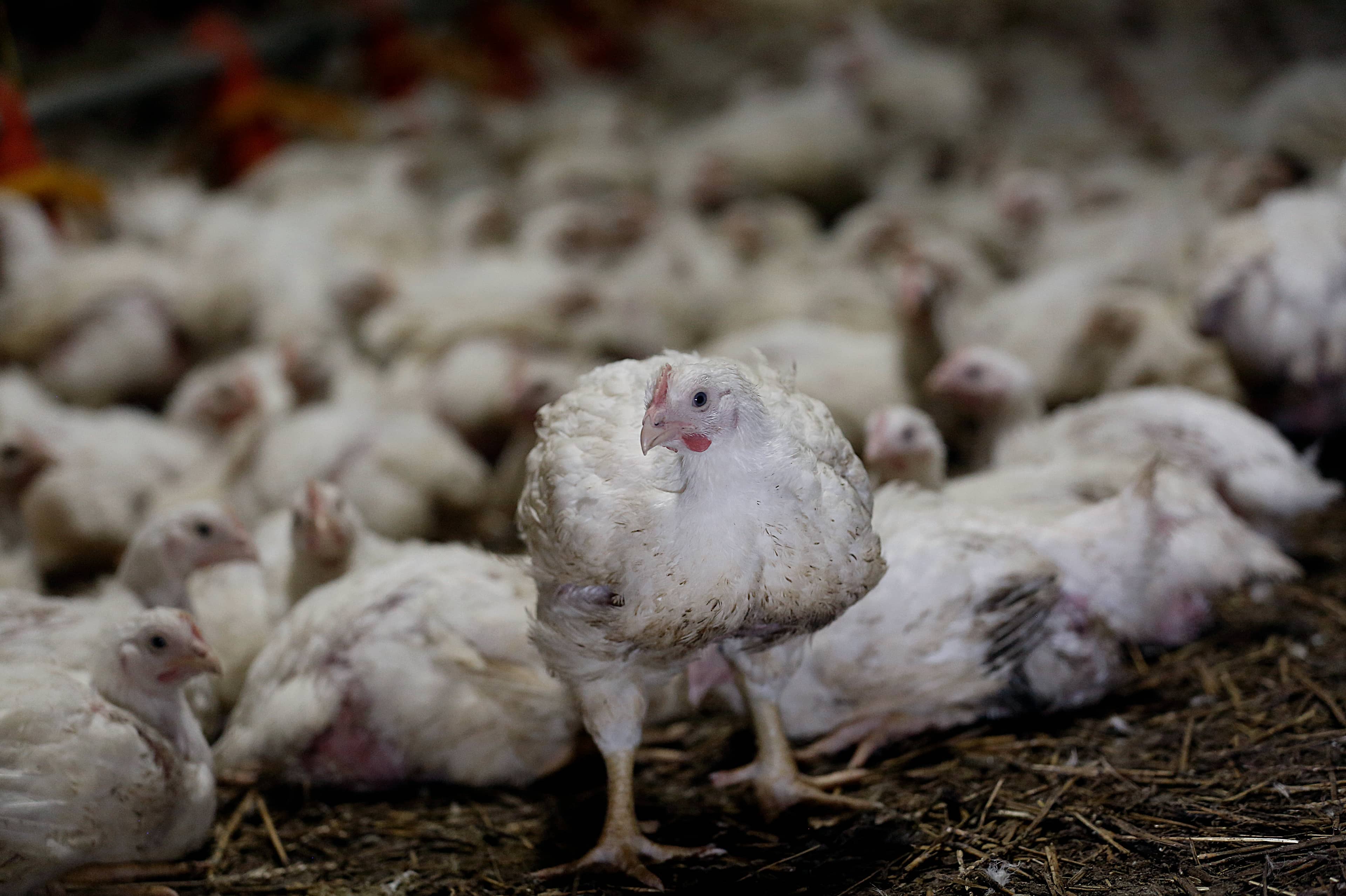




Ever wondered how factory farming has changed animals’ bodies? The truth will shock you.

What came first, the chicken or the egg? The modern answer to this classic question is… well, actually, the red jungle fowl came first.
Unfortunately, decades of breeding by the factory farming industry have produced chickens that barely resemble their wild ancestors. Instead, most of the chickens raised today are from fast-growing breeds, and they suffer terribly in their few short weeks of life before they are slaughtered for food.
Are chickens bred to suffer?
Chickens raised for meat, known as broiler chickens, have been farmed in industrial quantities since factory farming began to take off from the 1950s onwards. Today, over 66 billion chickens are slaughtered for meat each year globally, including over 1 billion in the UK.
The modern-day broiler chicken descends from the red jungle fowl, which is typically found across Southeast Asia. They regularly bathe in dust to keep the right levels of oil in their plumage and they are attracted to ripe fruit and seeds.

Although the jungle fowl was domesticated around 8,000 years ago, it’s only in the last few decades that human-controlled breeding has created the broiler chicken (chicken raised for meat) that is raised on factory farms around the world today.
These chickens have been bred to produce as much meat as quickly as possible, with little regard for the impact this has on their welfare. As a result, modern broilers grow three times faster than the original red jungle fowl. This means that their bodies put on weight too fast for their skeletons to keep up with, leading to a whole range of painful health issues which cause so much unnecessary suffering.
Are laying hens bred to produce more eggs?
Egg-laying hens today have been selectively bred to produce more than 250 eggs per year. This is a shockingly high number, considering that their ancestor, the red jungle fowl, lays only around 10-15 eggs each year.
This rate of egg production is a result of decades of breeding that has focused on increasing productivity with little regard for animal welfare. The constant egg-laying depletes hens’ stores of calcium, leading to high rates of osteoporosis and bone fractures. This is made worse by the tiny cages that many hens are kept in, which restrict movement and make brittle bones even more likely.
After about 18 months of life, most laying hens are considered ‘spent’ by the industry and are sent to slaughter.
Have dairy cows been bred to produce more milk?
Milk yield per cow has more than doubled in the last 40 years. Many cows now produce more than 20,000 kg of milk per lactation. This has been achieved via selective breeding by the dairy industry, which prioritises productivity over animal welfare.
It is not surprising then that multiple scientific studies have found links between high milk yields and poor welfare for cows.
Lameness, which can be a very painful condition, is more common in cows which produce a higher milk yield. This is because udders swollen with huge amounts of milk put extra load on the feet. In recent decades, lameness has become extremely prevalent across UK dairy herds, as milk yields continue to be pushed up.
Increasing milk yields has also reduced the average lifespan of cows, increased infertility, and increased the occurrence of painful conditions such as mastitis, which is an inflammation of breast tissue.
After around three years, far below their natural lifespan of over 20 years, dairy cows are often slaughtered as their milk production begins to decline.
Cruel breeding is a result of factory farming
The cruelty inherent in the selective breeding of animals for food is clear. The growth in factory farming and meat consumption around the world has resulted in an explosion in the number of broiler chickens and hens which are bred to suffer in the name of increased productivity.
The Humane League UK is campaigning for companies to sign up to the Better Chicken Commitment, which includes a requirement to use slower-growing breeds of broiler chicken. We also challenged the Government in court for allowing the use of fast-growing breeds of broiler chicken on UK farms.
You can take action
Farmed animals are suffering today because of their breeding, the conditions they are kept in, and the way they are slaughtered. You can help us to create a better word for animals by signing up to our emails to receive quick, easy actions you can take to join the fight against factory farming.

 Jamie Gittins
Jamie Gittins







